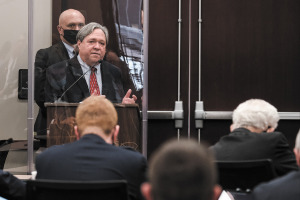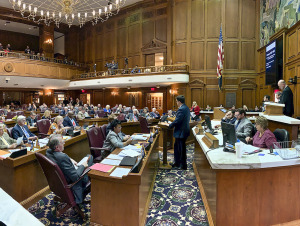
Gambling bill could help bars recover
Senate Bill 245 would double the prize limits for certain pull-tab games and allow the 1,242 bars and taverns with Type II gaming licenses to offer sports-themed pull-tab games and tip boards.

Senate Bill 245 would double the prize limits for certain pull-tab games and allow the 1,242 bars and taverns with Type II gaming licenses to offer sports-themed pull-tab games and tip boards.

Gov. Eric Holcomb is not having much luck getting what he wants from the General Assembly this year, even though both chambers are overwhelmingly dominated by his Republican Party.

Three bills advancing through the Indiana General Assembly would provide tighter regulation of pharmacy benefits managers (PBMs).

General Assembly has avoided COVID outbreak, but debated the budget and gubernatorial powers as tempers flared over racial issues.
Republicans tout their proposal as giving parents more choices over how to educate their children, while Democrats and other opponents argue that it further drains funding from traditional school districts.

Researchers who have studied work-share programs—which have been implemented in 28 states—say thousands of Indiana workers have been unnecessarily laid off.

The letter—signed by leaders at Eli Lilly and Co., Elanco, OneAmerica, Anthem Inc., IU Health, Salesforce and Roche Diagnostics, among others—acknowledges that the city faces economic, housing and crime problems, but the executives say they believe local officials are the ones best equipped to tackle those challenges.
Senate Bill 392, authored by Republican Sen. Mike Young of Indianapolis, would give each township in Marion County—except for Center Township—its own board of zoning appeals. Speedway, Lawrence, Beech Grove and Southport would also have zoning boards.
Gov. Eric Holcomb and a group of lawmakers and family advocates are pushing for legislation that would require companies to offer more breaks or modify schedules and tasks for pregnant women—if they need them.
Lawmakers seeking to curb gubernatorial power in emergencies might want to think twice about whether they are prepared for the aftermath.
State lawmakers face the once-a-decade task of drawing new districts for congressional seats, along with the 100 Indiana House and 50 state Senate districts, based on population shifts.

Senate Bill 1, authored by Republican Sen. Mark Messmer of Jasper, would shield businesses and individuals from coronavirus civil liability lawsuits unless there was gross negligence or willful or wanton misconduct that could be proven with “clear and convincing evidence.”

Fifteen states already allow concealed carry without a permit, and lawmakers in nine others have proposed allowing or expanding the practice.
Bill sponsor Sen. Jack Sandlin of Indianapolis referred to the legislation as a “preemptive measure.”
Under state law, the Indianapolis Public Transportation Foundation is supposed to raise about $6 million per year to supplement revenue generated by a Marion County transit tax. So far, it’s well behind the goal.
A top Republican wants to make sure lawmakers have a say in whether emergency orders last longer than 30 days—but that requires them to be in session.

Several state lawmakers have been drafting coronavirus immunity legislation over the past several months as efforts in Congress to pass federal legislation have stalled.
Indiana Gov. Eric Holcomb on Thursday morning announced his 2021 legislative agenda, which largely focuses on continuing projects and programs his administration has already been pursuing.
The business-advocacy organization also said it re-elected board Chairman Dennis Murphy of IU Health and the rest of the board’s executive committee.

Host Mason King talks with IBJ Statehouse reporter Lindsey Erdody about what legislative leaders are saying about the budget, which state programs could be on the chopping block and what spending the Republican-majority will prioritize.